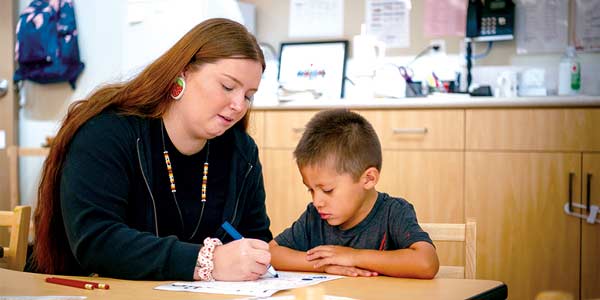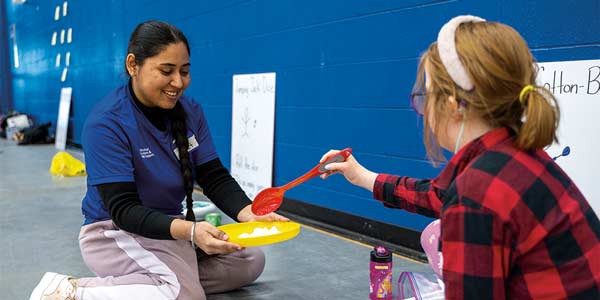- Students applying to the ECE program should recognize the physical demands involved in caring for children and may be required to lift up to 22.7 kilograms (50 pounds).
- Additionally, some Boards of Education have instituted a fit for field test.
About this program
-
Credential Awarded: 1 Year Graduate Certificate
-
Code: 1220 P1220
-
Delivery Length: 1 Year
-
Online Program Delivery (What's this?)
All courses are delivered virtually through a combination of synchronous and asynchronous online delivery. The program can be completed fully remotely.
Who are you?
- I am a domestic applicant. *
- I am an international applicant.
Your education at Niagara College begins with your application. We're here to help make the process easy!
- Carefully read the Admission Requirements tab to make sure you meet the program requirements.
- Check the Availability tab to see whether or not the program is accepting applications, and what start dates are available.
- Complete an application online through ontariocolleges.ca.
- Our Admissions Office will acknowledge your application has been received and will provide you with your NC Student ID number and details on your next steps.
Your education at Niagara College begins with your application. We're here to help make the process easy!
- Carefully read the Admission Requirements tab to make sure you meet the program requirements. Official, translated high school and/or post-secondary transcripts, proof of graduation and proof of English proficiency will be required.
- Check the Availability tab to see whether or not the program is accepting International applications, and what start dates are available.
- For next steps in the application process please visit international.niagaracollege.ca/how-to-apply/.
- Complete an application online through our Online Application Form.
- Niagara College will send you or your agent a confirmation of receipt via email within 48 hours of receiving your application.
By Email
Reach out to us using our contact form and we'll respond within regular business hours.
Contact UsOne-on-One Session
Have questions about this program or NC? Speak with a friendly Student Recruiter!
Book a One-on-One SessionRequest Program Information
Want to receive more information about this program? Join our email list to receive program and event updates!
On-Campus Tours
Book a tour at one of our campuses and explore our incredible learning and service spaces in-person!
Book an On-Campus TourVirtual Tours
Take a self-guided, virtual walking tour of our campuses and explore our labs and common spaces.
Take a Virtual TourInformation Sessions
Join us for an information session and explore the pathways and programs offered at NC!
Register for an Info SessionOverview
Designed for graduates of Early Childhood Education programs, this post-graduate certificate equips students with the specialized skills needed to support children with exceptionalities and their families.
Emphasizing inclusive education, the curriculum covers assessment strategies, individualized programming, and methods for effective collaboration with families and community partners. Students gain valuable hands-on experience through two field placements.
Courses
| Code | Course Name | Credits |
|---|---|---|
| EDUC9110 | Foundations of Early Childhood Resource Consulting | 3 |
| EDUC9115 | Supporting Atypical Development | 3 |
| EDUC9120 | Adapting Curriculum Practices | 3 |
| PRAC9130 | Field Placement I - ECE - RC | 3 |
| Code | Course Name | Credits |
|---|---|---|
| EDUC9210 | Evidence Informed Decision Making | 3 |
| EDUC9215 | Empowering Families Through Strength-Based Approaches | 3 |
| EDUC9220 | Working With Others Through Professional Engagement | 3 |
| PRAC9230 | Field Placement II - ECE - RC | 3 |
Learning Outcomes Term: 1264
Build and maintain responsive relationships and partnerships with children with special needs and families from diverse cultural and linguistic backgrounds including Indigenous peoples’ worldviews and Francophone identity, to provide culturally relevant early learning opportunities, programs and services.
Recommend, discuss and plan, in partnership with families and early childhood educators, inquiry and play-based early learning program adaptations to accommodate and support learning, holistic development and well-being in children with special needs.
Advise and lead early childhood educators and children’s service partners in the development of a philosophy of inclusion and policies and practices that support diverse, equitable and accessible learning opportunities for children with special needs and their families.
Administer observation strategies and screening tools to interpret and document children’s learning and to identify children with challenges and facilitate families referrals to resources for further assessment and intervention as necessary.
Collaborate with children, families, early learning educators, health professionals and children’s service partners to facilitate the planning, co-ordination and evaluation of individualized support plans for children with special needs.
Plan, deliver and evaluate strength-based training to children, families, early childhood educators and children’s service partners to support quality, inclusive early years and child care programs and services for children with special needs and families.
Provide consultation, service coordination and referral support to families, early childhood educators and children’s service partners to support communication, collaboration and continuity of services for children with special needs and families.
Comply with current legislation, regulations, policies and evidence-informed practices in early years and child care settings to provide quality early learning programs and services for children with special needs and their families.
Advocate for inclusive, meaningful and purposeful early learning opportunities and services for children with special needs, their families and communities.
Engage in reflective practice and keep current in emerging research within the early years sector to lead initiatives related to inclusive practice and improving early learning opportunities, programs and services for all children and especially those living with special needs and their families.
Admission Requirements
- Ontario College Diploma in Early Childhood Education, or proof of registry with the College of Early Childhood Educators (CECE) and
- Proof of English proficiency
Selection and Ranking
Testing or other supplemental evaluation may be required.
Learn more about admission decisions.
Note
Most private college courses and/or credentials are not acceptable as admission requirements for Niagara College programs.
Please contact the Admissions office at [email protected] for assistance.
Program Requirements
Criminal Record Check
- A Criminal Record Check with Vulnerable Sector Screening (CRC-VSS) which is less than 6 months old is required at the beginning of the program.
- Students with criminal charges for convictions will be significantly limited in placement, clinical, and/or employment opportunities in this field. The decision of whether a student with criminal charges or convictions is eligible to secure a field placement ultimately lies with the field placement agency.
- Field placements must be completed in order to graduate.
-
Students will be required to obtain a Vulnerable Sector Screening (VSS) in order to be cleared for placement/clinical. Please note, in order to obtain a Vulnerable Sector Screening (VSS), students must be 18 years of age or older. If a student is not 18 years of age or older at the start of this program, they will experience delays in progression through the program.
Communicable Disease Surveillance
- The confidential Communicable Disease Surveillance (CDS) Form must be completed and submitted to Student Health Services prior to the start of the program.
- Please view the CDS Form and Checklist for health requirements at niagaracollege.ca/cdsform/.
- This process may take up to 10 weeks or more and requires a visit to your personal physician and/or a Public Health Department.
- If the CDS process is not completed your placement, clinic or co-op opportunity will be denied.
First Aid and CPR
- Current Standard First Aid certification and Cardiopulmonary Resuscitation (CPR) Level C certification is required other
Transportation
- Students are responsible for their own transportation in order to complete program requirements which may not be readily accessible by public transportation.
-
Program requirements could include co-ops, placements, volunteer requirements, practical labs, field projects, assignments, clinicals, or any other off-campus visits required as part of the program’s curriculum.
Computer Requirements
Students are responsible for ensuring that they have a Microsoft Windows-based desktop or laptop that meets or exceeds the following general requirements:
- A desktop or laptop running on an updated Microsoft Windows operating system (Windows 11 recommended).
- Minimum 256GB SSD storage and 8 GB memory (note that 16 GB memory is strongly recommended).
- An integrated or peripheral video camera, microphone, and speaker system.
- Reliable internet connectivity with Broadband capabilities. A minimum download speed of 10 – 50 Mbps is recommended.
Niagara College may not be able to provide support for systems different than the above specifications as provided software may not operate properly. Academic software for your courses will be made available for download and remote use. Access will also be provided to remote high performance computer labs if software downloads are not feasible.
Note: We do not provide support for Chromebooks or Apple products. (learn more)
For most programs, the recommendation is to have a MS Windows 11 computer for an optimal experience and for ease of downloading academic software. The reliability of remote connections to college computers and software cannot be guaranteed for Macbook and Chromebook users.
The Microsoft Office suite products that are available free to Niagara College students though Office 365 do have versions that work with Macbooks and Chromebooks, and most internet-based applications will work as well. However, some program-specific software is designed to run on Windows 10/11, and the successful download of these applications cannot be guaranteed.
Our Learning Management System (LMS) at Niagara College is Brightspace, and while students can access Brightspace through an internet browser, for some assignments and tests there is a layer of security that uses a proctored browser. The proctored browser will not function on Macbooks or Chromebooks.
Students assume the risk of a compromised virtual experience if they choose to participate without the recommended technology.
All costs associated with program requirements are the responsibility of the student.
Back to TopAvailability
Note: Online Program Delivery
The delivery of this program is online only for all intakes.
Legendfor intake status table
Open
Accepting applications
Waitlisted
Eligible applications will be placed on a waiting list
Closed
Not accepting applications
Suspended
No longer offered this term
The College reserves the right to cancel or make changes to any course or program, fee, procedure, or campus location at any time.
Back to TopPathways
Explore your pathway options What are pathways? for the Early Childhood Education – Resource Consulting program below.
Applicants with previous postsecondary education will be assessed for transfer credits upon receipt of an official transcript from their previous institution. There is no fee for this service.
Tuition
The below is a tuition fees estimate ( what's this?) for the indicated start term. Tuition fees are set in accordance with the Ontario Ministry of Training, Colleges and Universities fee guidelines.
Tuition information is currently unavailable.TIP: Fees for other terms may be available through the Advanced Tuition Tool.
We're helping make your NC dreams a reality.
To help fund your education access $1.5 million in scholarships and awards made available by our generous donors. You will be automatically considered for some awards, however other awards will require an application.
Explore Scholarships & BursariesAdvanced Tuition Tool
The tuition amounts provided are an estimate only ( what's this? ).
To generate a detailed fees calculation, which includes tuition, ancillary, and material fees for this or a different start term, please access the Advanced Tuition Tool.
Generate My FeesThe below is a tuition fees estimate ( what's this?) for the indicated start term. Tuition and estimated fees for International students are based on program type.
Tuition information is currently unavailable.TIP: Fees for other terms may be available through the Advanced Tuition Tool.
We're helping make your NC dreams a reality.
Access over $200,000 in scholarships and awards.
Explore & ApplyAdvanced Tuition Tool
The tuition amounts provided are an estimate only ( what's this? ).
To generate a detailed fees calculation, which includes tuition, ancillary, and material fees for this or a different start term, please access the Advanced Tuition Tool.
Generate My FeesCosts and Dates
General information about other costs, due dates, refund policy, housing costs, and more can be found on the Niagara College International website.
What is your tuition estimate?
Your tuition estimation includes tuition, ancillary, and material fees based on a program and term. Fees may vary upon enrolment into specific courses that are outside of the core curriculum or elective courses. Fees for future terms (where fees have yet to be published) are estimates based on the current academic year fee structure.
Additional fees include textbooks and a parking pass (if parking on campus). Additional costs may be incurred for optional field trips, learning materials, equipment or clothing. All costs associated with program requirements are the responsibility of the student.
Note: For new programs tuition and fees may not yet be available. Typically tuition amounts are available in May for the next academic year. Please check back.



